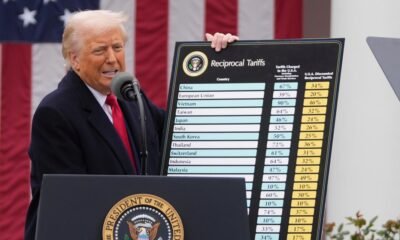courts
Judge Declares Sections of State’s Voting Rules Illegal

A Maricopa County Superior Court judge has ruled against parts of Arizona’s Elections Procedures Manual, describing certain speech restrictions as unconstitutional. Judge Jennifer Ryan-Touhill determined that the manual’s stipulations prohibiting voter harassment equated to “speech restrictions in violation of our Arizona Constitution” and misrepresented state statutes.
The lawsuit, initiated by the Arizona Free Enterprise Club and America First Policy Institute, argued that the manual imposed undue limitations on free speech. Attorney Andrew Gould hailed the ruling as a significant win for political expression. The manual had aimed to curb activities like aggressive behavior and misleading information dissemination at voting sites, which the plaintiffs claimed infringed upon free speech.
The Secretary of State’s office, however, stated their intention to appeal the decision, emphasizing that while they respect the court’s viewpoint, they believe the injunction could be excessively broad for the upcoming general election. The appeal underscores the ongoing legal tug-of-war over election protocols in Arizona.
Ryan-Touhill scrutinized the challenged provisions thoroughly before delivering her verdict. She emphasized that terms like “harassment” must be carefully defined according to state law, and criticized the manual for potentially expanding criminal liability beyond what the statutes permit. Her observations raised questions about the line between guidance and legal mandates.
The state’s argument that the manual served merely as a behavioral guideline rather than imposing new criminal penalties did not convince the judge. Comparing the manual to airport security advisories, Ryan-Touhill highlighted that participation in air travel is not a constitutional right, unlike voting. This distinction formed a crucial part of her rationale for rejecting the manual’s controversial provisions.
Despite the court’s favors towards the plaintiffs on certain counts, Ryan-Touhill also dismissed several of their challenges, including issues around ballot requests, early voting lists, and signature verification processes. However, some provisions related to voter status and military ballots remain in contention and will likely be part of further litigation.
Gould expressed confidence that the ruling would withstand any forthcoming appeal. He argued that the provisions unlawfully restricted political dialogue, which is fundamental to democracy, even if such dialogue becomes heated or confrontational. The state’s ongoing federal challenge on similar grounds hints at a prolonged fight over election laws.
The case underscores the complexities surrounding election laws and the balance between ensuring orderly voting processes and safeguarding free speech rights. As appeals and further court sessions loom, Arizona’s election procedures remain under intense judicial and public scrutiny.


















